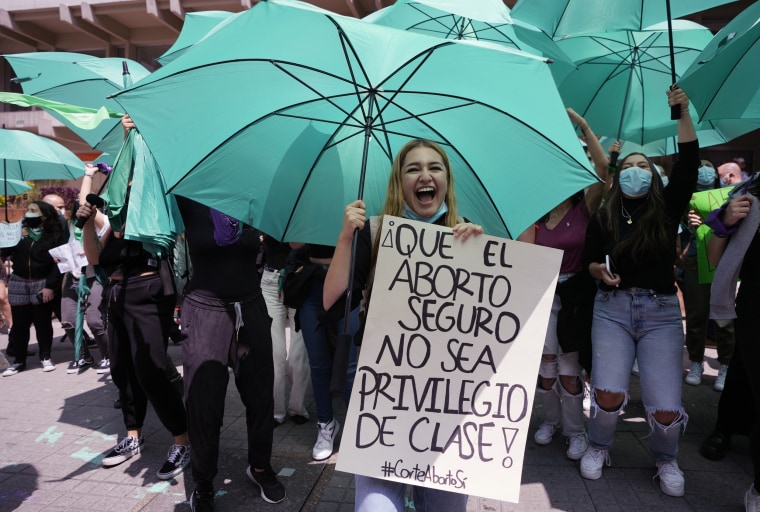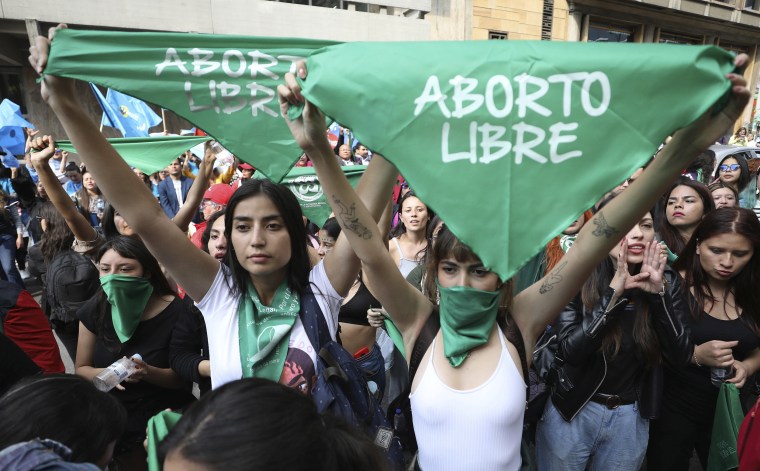Women's groups that sued to decriminalize abortion in Colombia are pushing for a decision after a much-anticipated ruling from the country's top court was postponed last week.
“The court owes it to women," Catalina Martínez Coral, the Latin America and Caribbean director of the Center for Reproductive Rights, told Noticias Telemundo.
The Constitutional Court has not yet decided whether to eliminate abortion as a crime from the country's penal code. The ruling had been expected last week, but the debate was interrupted at the request of one of its judges, Alejandro Linares, to recuse himself from voting because he had spoken about the case in a news interview.
If another judge decides there is no need for Linares to recuse himself, the court could rule this year. A recusal would start a process to bring in a new judge, which would delay the ruling to next year.
The women’s rights groups that filed the lawsuit, grouped under the umbrella movement Just Cause, say the delay harms women and girls in Colombia, where nearly 70 women die every year from complications from abortions, according to figures from Doctors Without Borders.
“Every day that passes there are more unprotected people because they cannot access reproductive health services. They are persecuted, and they have open cases against them,” Martínez Coral said. “It's a punishment for women and girls in Colombia.”
Since 2006, the Colombian penal code has allowed legal abortion under three circumstances: in cases of rape, incest or nonconsensual insemination; in cases of serious fetal malformation that makes life unviable; or when the medical team certifies that a pregnant woman’s health or life is at risk.
Any woman who otherwise undergoes the procedure — or the health personnel involved — can be liable for a penalty of 16 to 54 months in prison. According to official figures, 400 women are prosecuted every year.
“It is a very unfair situation, because, on the one hand, exceptions give you a right, but it is also a serious crime that generates social and institutional stigma," said Ximena Casas Isaza, a researcher for Human Rights Watch. "All this creates many barriers for women and girls in situations of greater vulnerability who, in the end, do not have access to an essential health service such as the legal interruption of pregnancy.”
An estimated 400,000 women and girls undergo induced abortions in Colombia every year, about a third of whom suffer some complication. Unsafe abortions are the country’s fourth-leading cause of maternal mortality.
Several studies have determined that girls and adolescents suffer the most sexual abuse resulting in unwanted pregnancies. In many cases, their lives are at risk.
According to a report by Just Cause, the victims in 73 percent of the 26,158 cases prosecuted for allegations of sexual violence were girls or adolescents up to age 17. They are also the ones who suffer the most from harassment by the penal system, the report said.
‘What we want is more support’
Cindy, a Colombian woman whose last name is being withheld to protect her identify, said she was in no condition to raise a child but was afraid she would suffer recriminations from her family for terminating her pregnancy. She decided to talk to her partner and a good friend, who accompanied her throughout the abortion process.
“Those of us who made this decision, what we want is more support — let them understand that, for some reason, that was the decision we made,” she said.

Cindy and hundreds of other Colombian women have participated in awareness campaigns like We Are All One, speaking out with dozens of nongovernmental organizations and women’s rights groups to demand the decriminalization of abortion.
The movement has been driven by the recent wave of reforms and demonstrations for women’s rights in various Latin American countries, such as Argentina and Mexico.
Girls and adolescents are the most affected
The Just Cause report found that for most of the girls and adolescents who get pregnant through rape and sexual abuse, “the aggressors correspond to people from their social or family circle,” adding, “These heartbreaking figures only correspond to those cases that are reported.”
The health care system uses the current law as an excuse to deny services, said Paula Ávila-Guillén, the executive director of the U.S.-based Women’s Equality Center, who directs the group’s Latin America initiatives. "That is why we have so many cases of pregnant girls as a result of rape who cannot access abortion, because there are many bureaucratic barriers."
According to the group Mesa por la Vida y la Salud de Mujeres, minors account for 12.5 percent of abortion investigations — almost a quarter, 24 percent, are convicted.
While the crime may not lead to jail time in many cases, it still has a serious impact on young women's lives, who are left with criminal histories that prevent them from getting work and progressing, said Martínez Coral of the Center for Reproductive Rights.
The persecution of health personnel
“There is a lot of fear on the part of medical professionals, because first the burden of certifying the conditions for abortion falls on them and, when you are faced with the possibility of having legal problems, it is obviously much easier to turn your back on the problem," said Dr. Laura Gil, a gynecologist and a member of the Medical Group for the Right to Decide.
An investigation by the Life and Health of Women Roundtable, a women's health advocacy group, found that, from 1998 to 2018, the prosecutor’s office processed 5,580 complaints of abortion and that in 75 percent of the cases, it was doctors and other health care operators who filed complaints about women who went to hospitals feeling ill from having abortions.
That, Gil said, has a chilling effect on other health care personnel.
“Many doctors begin to ask for a number of evaluations, examinations and requirements — the only thing they do is create barriers. It is an obstacle to the free exercise of our profession," Gil said.
What would total decriminalization change?
The first effect would be that no one could be prosecuted for the crime of abortion. In addition, women, adolescents and girls would be able to terminate pregnancies without barriers.
“Women who were not protected by the exceptions that existed in the country will be able to access abortion the day after the decision is made,” Martínez Coral said.
Lawyers for women who are prosecuted or detained could also “directly introduce an appeal to initiate their release,” she said.
Catholics who support abortion rights
Groups that oppose abortion, including conservative political movements and the Roman Catholic Church, have spoken out against the proposal.
The group Catholics for the Right to Decide stands out, because it supports the lawsuit.
“We consider that supporting abortion as a right is not incompatible with having beliefs or a spiritual life," said Aura Carolina Cuasapud, a lawyer for the organization. "Quite the contrary: We know that women are the majority of the people who form the foundations of religion and the church, so we must have a voice, and we have the right to make free decisions."
Members of the movement are called false Catholics or hypocrites on social media, where opponents link some of them to satanic sects and threaten them with excommunication from the Catholic Church. Cuasapud laughed when she was asked about the attacks.
“At worst, excommunication does not inhibit you from being a Catholic. If you were baptized, they can no longer remove that condition, they cannot remove your beliefs," she said, adding that she believes that "the truth is that neither the Bible nor the Church nor God condemn abortion as a sin, and many people do not know that."
An earlier version of this story was first published in Noticias Telemundo.
Follow NBC Latino on Facebook, Twitter and Instagram.
